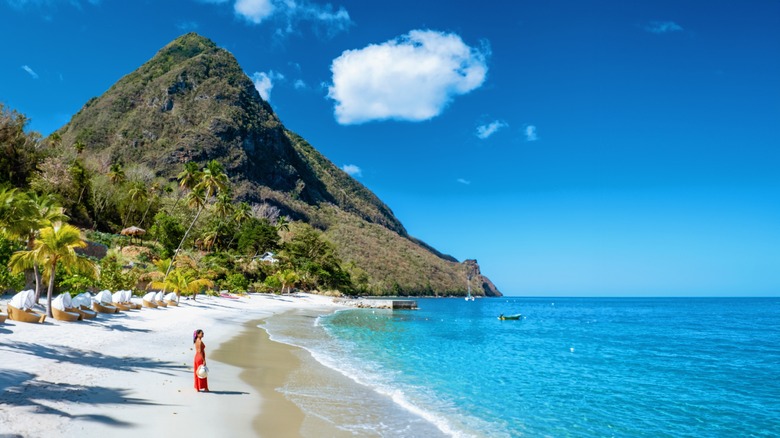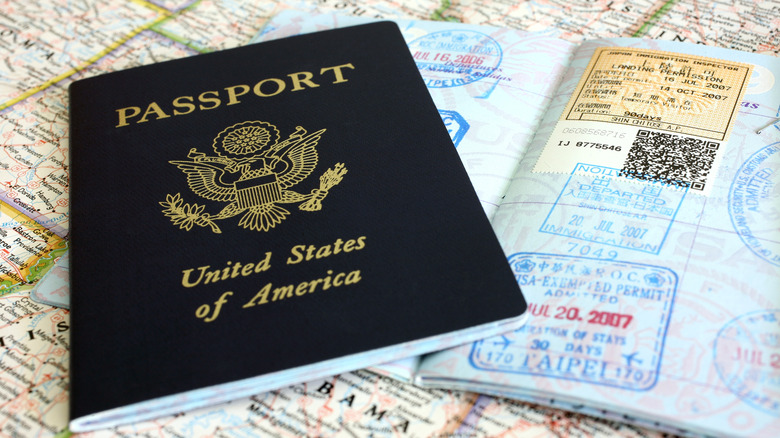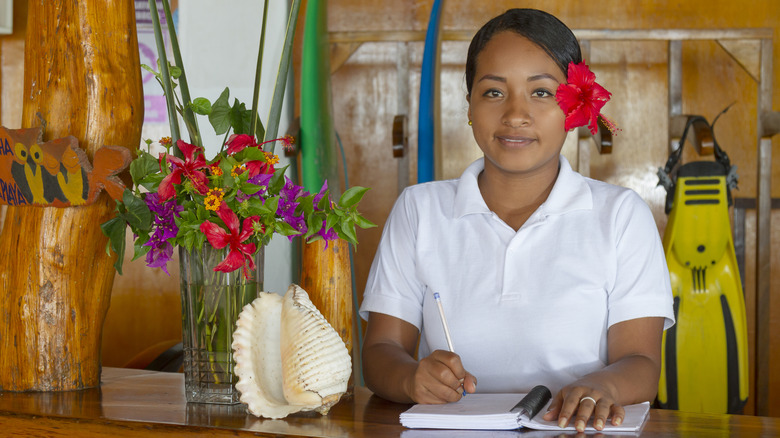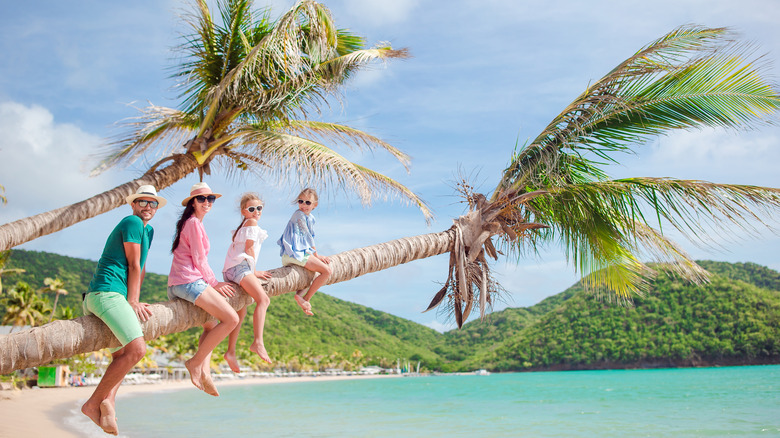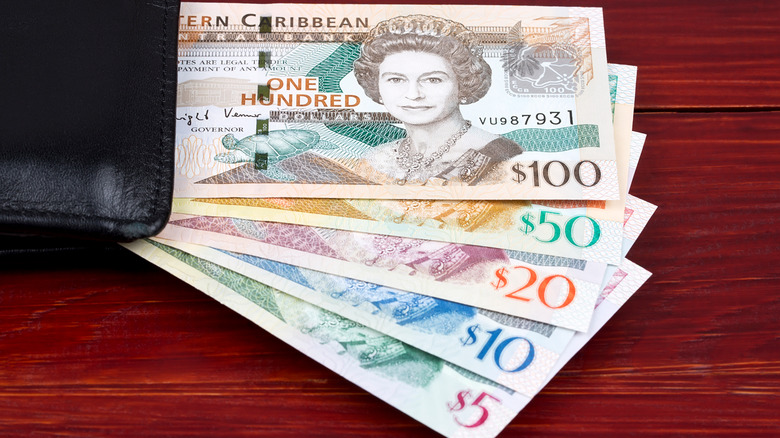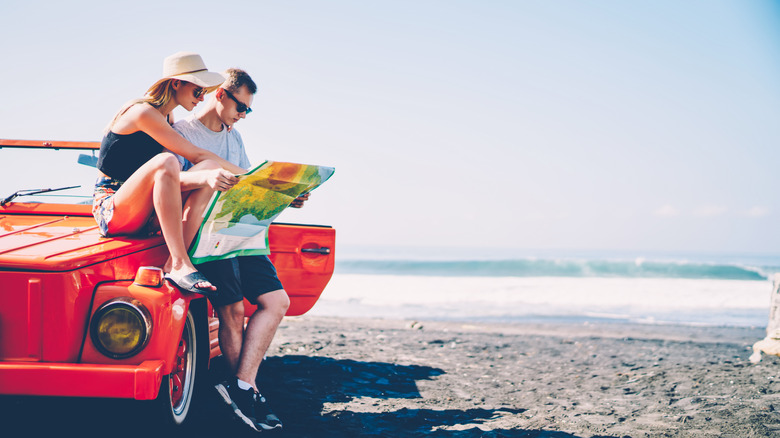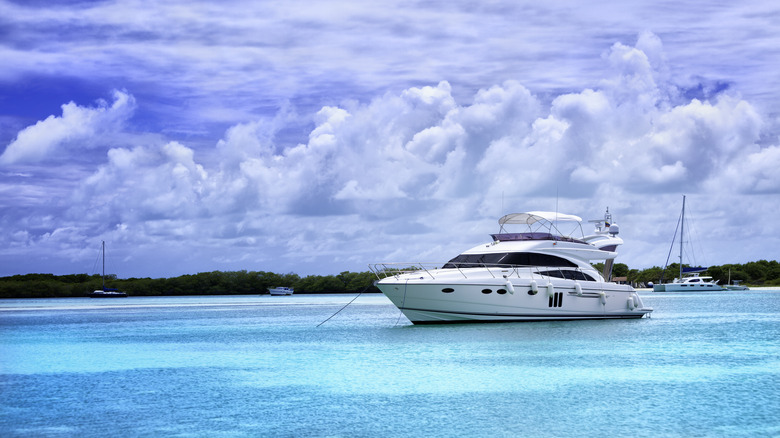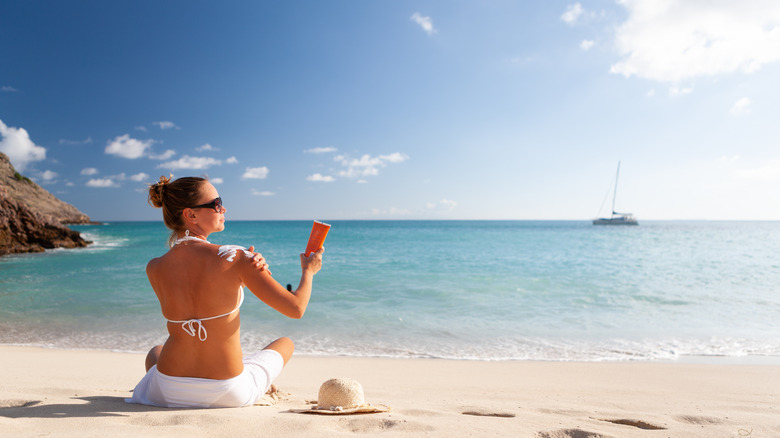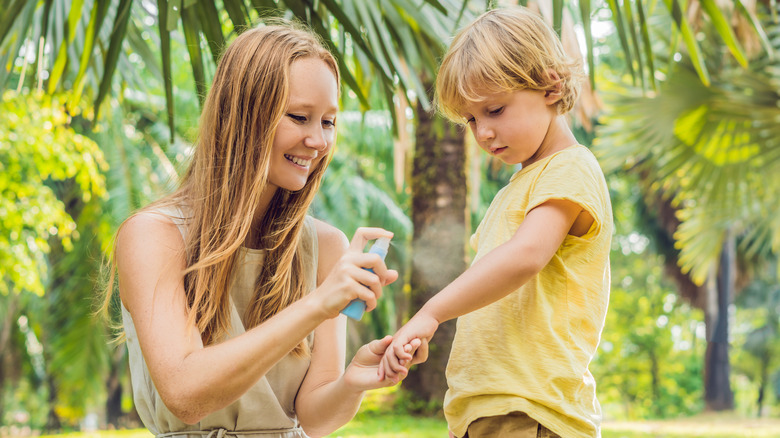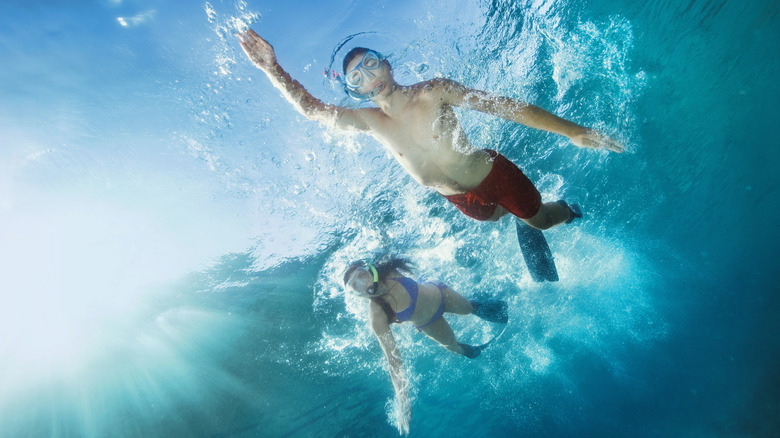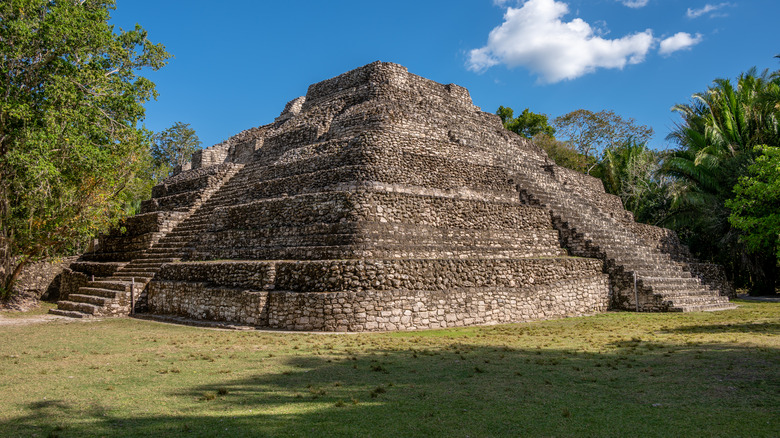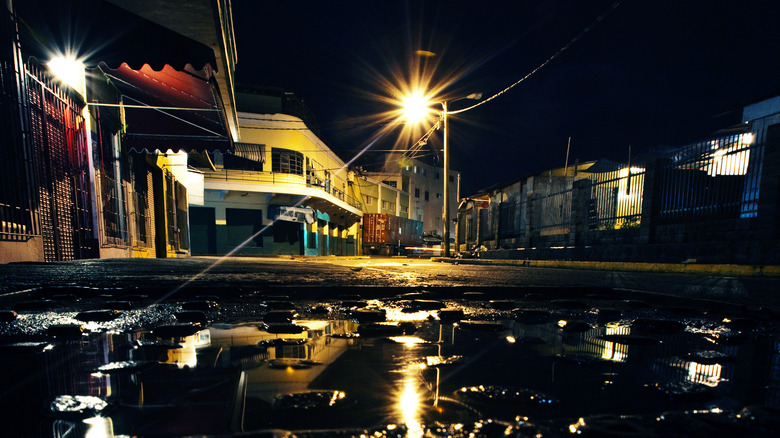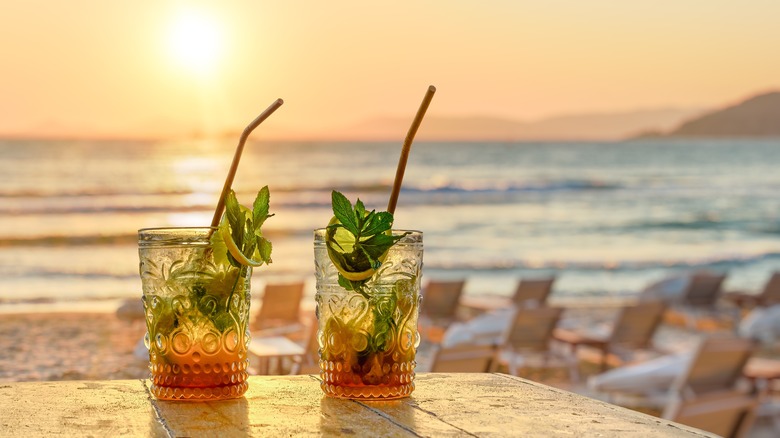Don't Vacation In The Caribbean Before You Know These Crucial Things
Are you looking for an affordable beach vacation filled with pristine sandy strands, turquoise seas, and exciting activities for the whole family? Set your sights on the Caribbean. An Elysian region peppered with idyllic islands, colorful coral reefs, lush mountains, and groove-worthy music, there's a lot to love about this tropical beauty. As with most things in life, it's best to be prepared before your adventure. We've scoured reviews, expert advice, and government sites to find the most essential points you should consider before a trip so that you can have an easy and affordable Caribbean vacation.
From tips on protecting yourself from illness and sunburn to what currency to bring or whether it's safe to drink the water, this list will help guide you toward a happy, safe, and utterly enjoyable beach holiday. Our main advice: don't vacation to the Caribbean before you know these crucial things. Oh, and pack an extra bathing suit; you'll want to spend lots of time swimming, snorkeling, scuba diving, and playing in the translucent water.
You need a passport to vacation in the Caribbean
Before you leave, be sure your passport is up to date (or at least six months from expiring). Passports are required to enter almost all Caribbean islands (Puerto Rico and the U.S. Virgin Islands being an exception), and you'll need them to reenter the U.S. and Canada. If you need to renew your passport, do so at least three months before you travel.
As for a visa, you shouldn't need one unless you plan to stay in Jamaica for over 90 days. Barbados requires a visa if you plan to visit for more than six months. The Bahamas requires a visa for people of specific nationalities. Americans won't need one unless they plan to stay for more than eight months, and Canadians will only need a visa if they visit for more than 30 days. Otherwise, you should be in the clear visa-wise, but some countries require visitors to submit a tourist card. Are you confused yet? Check with the country's immigration or tourist website before leaving home.
Avoid drinking tap water
Depending on where you travel, it's safest to drink bottled water instead of gulping from the tap, especially if you suffer from gastrointestinal problems. While Aruba's tap water has been deemed safe, other countries like Puerto Rico have questionable water. Mexico's water can also cause tummy issues that you won't want to deal with on vacation (or at home, for that matter). An article about Jamaica on the CDC's website claims tap water is safe for drinking in "most tourist lodgings" in this country. However, bottled and filtered water should also be available, which is a safer bet to stay healthy. Don't forget that tap water is often used to make ice, so you'll want to be careful when consuming beverages with ice in certain areas.
In general, use common sense when it comes to quenching your thirst in the Caribbean. If you're visiting a rural area, the water could be contaminated with disease-causing bacteria, parasites, or viruses. If you're thirsty, your safest bet is to drink bottled water or do as the locals do and down some rum. This tasty drink is a must-try when visiting the Caribbean. As a related aside, the CDC cautions tourists to be careful about consuming the national dish of ackee fruit. This can lead to health complications if it isn't prepared correctly. Never eat the fruit raw, and only try it if you're sure it's been prepared by someone reputable.
English is widely spoken
Good news! You won't have to struggle to communicate with the locals during your vacation in the Caribbean. Due to its long history of colonization by Europeans, the Caribbean has six official languages -– Dutch, English, French, Spanish, Papiamentu, and Haitian Creole. If you speak any of these, you're in luck. Spanish is the primary dialect used in Cuba, Puerto Rico, and the Dominican Republic. At the same time, English is considered an official language in most other areas, including the Bahamas, Barbados, Anguilla, Antigua, Cayman Islands, Jamaica, Trinidad and Tobago, Turks and Caicos, Dominica, Grenada, and the British and U.S. Virgin Islands.
English is the third-most spoken language in the Caribbean, behind Spanish and French. It is also the official language of 19 Caribbean territories. Most of the nearly 6 million people who live in these territories speak some version of Creole while learning English at school. Seen as the Caribbean's "unofficial language for tourism," you're bound to find someone who can communicate with you in English no matter which island you choose to visit.
Visit during high season for the best weather
If you're hoping for good weather and don't mind paying higher prices for airfare and hotels, the best time to visit the Caribbean is December through April. These months fall in the region's high season, which means you won't be alone during your vacation — plenty of travelers flock to the sun-drenched beaches at this time of year, especially those traveling from a colder destination. December to April is the dry season, so tourists visiting at this time will be blessed with sunny skies, little rain, low humidity, and comfortable temperatures–we're talking mid-70s to mid-80s Fahrenheit. Not bad!
While the Caribbean climate is warm and mostly sunny year-round, it tends to rain more frequently on the islands between May and November, which is fittingly known as their rainy season. A riskier time to visit the Caribbean is between June 1 and the end of November. Those who venture there during this time could butt heads with a hurricane, especially if they arrive during August or September, which tend to be the most active months for big storms. The upside to traveling during this season could outweigh the risks — flight and hotel costs tend to be cheaper at this time. Don't stress! No matter when you choose to visit, you will surely have a great time. And it's easy to have a weekend getaway in Turks and Caicos and many other islands in the Caribbean year-round.
Many Caribbean islands accept U.S. dollars
While the U.S. dollar is only the official currency for Turks and Caicos, the U.S. Virgin Islands, and Puerto Rico, it is widely accepted throughout the Caribbean. The Eastern Caribbean Dollar is the official currency of Anguilla, Antigua and Barbuda, Commonwealth of Dominica, Grenada, Montserrat, St Kitts and Nevis, Saint Lucia, and Saint Vincent and the Grenadines. 13 currencies are used throughout the Caribbean, including the Barbadian Dollar and Mexican Peso.
If you arrive at a restaurant or shop that posts a different currency (i.e., the Easter Caribbean dollar), it will more than likely accept U.S. dollars. Expect to receive local currency if you're owed change. And if you'd like to save some money on the exchange rate, consider exchanging money before your trip to avoid interest charges. Credit cards are an easy way to pay for things, but be sure to check the international exchange rate with your credit card company so you aren't surprised by a big bill upon your return home.
Renting a car is the easiest way to get around
In most cases, renting a car is the cheapest (and easiest) way to get around an island, as taking taxis often can become quite expensive. Plus, there's something very freeing about being in charge of where you go and when you get there. Rental cars make it easier to visit places off the beaten path. Expert travelers recommend renting a car at the airport (if there is one on the island you're visiting). Beware of extra charges. In Turks and Caicos, for instance, some rental car companies add fees for things like cleaning sand from the car.
Before you get behind the wheel, familiarize yourself with the rules of the road. The most important law? Drive on the left side. You'll also want to read up on how to use a roundabout if you haven't come across one before. If you don't feel comfortable with any of these, leave the driving to a professional.
Island hopping can be fun (and easy)
If you have enough time to spare on your vacation, make the most of it by exploring at least one other island, even if it's just for a day trip. While you're at it, try adding a few lesser-known Caribbean islands you've (probably) never heard of, like Salt Cay in Turks and Caicos or Isla de Mona in Puerto Rico. There are so many beautiful islands to visit in the Caribbean that it almost feels like a shame to limit a vacation to just one.
With quick flights and accessible ferries or speedboat rides on offer, it's a breeze to travel from one beautiful island to the next. If you've got extra padding in your bank account, why not splurge on a private yacht charter or a catamaran tour with a crew, sleeping quarters, and a chef? You'll be able to see plenty of tiny islands without having to disembark somewhere to spend the night.
Protect yourself from the sun
Just as you would at home, protecting yourself from sun exposure is important when vacationing in the Caribbean. Yes, it feels great to bathe in the sun's warm rays and frolic in the translucent waves this region is famous for, but there's nothing great about sunburn! In addition to its links to skin cancer, sunburns hurt, which can put a damper on your vacation. When choosing a sunscreen, look for one that's reef-safe.
With so much tourism and so many people swimming in the seas around these beautiful islands, protecting the Caribbean's marine life and coral reefs is essential. We don't want to add to the pollution by wearing an unsafe product. The U.S. Virgin Islands banned sunscreens containing oxybenzone, octinoxate, and octocrylene in 2020, and Aruba and Bonaire also stopped selling sunscreen that isn't reef-safe. Brands like Sun Bum, Maui, Babo Botanicals, Thrive, and CeraVe offer reef-safe sunscreens you can buy before you fly.
Use insect repellant
Besides being pesky and itchy as heck, bug bites can lead to serious illnesses, even in the Caribbean. Sand flies cause bumps that resemble a mosquito bite. They'll itch for a few days and should clear up on their own. Speaking of mosquitos, you'll also want to protect yourself against these bitey critters. Besides being annoying, they can carry diseases like Dengue fever.
Tiny crustacean organisms, sometimes called sand fleas, can cause small, red (and very itchy) bites or bumps. Like mozzie bites, these, too, should clear up with the help of an antihistamine cream in a few days. Actual sand fleas (not the tiny crustaceans) can dig a hole into your skin and cause infection. This infection can cause skin lesions and severe inflammation. Ew! The diseases caused by chigoe sand fleas tend to be more prevalent in poor and underdeveloped areas. To avoid bites, use an insect repellant containing DEET and wash your feet immediately after leaving the beach.
Practice safe swimming
With a plethora of fabulous beaches on offer in the Caribbean, spending a day at the shore is one of the best things to do in the area. The warm and wonderful water offers optimal snorkeling and scuba diving opportunities and plenty of water sports to please even the youngest travelers. Nothing can ruin a vacation faster than an accident, so it's best to practice safe swimming while on vacation, especially in the Caribbean. Many of the stunning beaches in this island nation have no lifeguards on duty. They may rope off certain sections to alert swimmers to dangers like sharp rocks or rip currents, but in terms of having a trained person on the lookout for water-based danger or harmful marine life at the beach, you may not get lucky.
If you're traveling with young kids or don't feel confident mastering the waves, it's best to scope out guarded beaches for your day at the shore. Some beaches in Barbados, Bermuda, Jamaica, Puerto Rico, Trinidad and Tobago, the U.S. Virgin Islands, and the Grenadines, for instance, have professional lifeguards on site. Others do, too, but you should do your research before visiting. Other tips for safe swimming include sticking with a buddy, never going too far out from shore, staying in designated swimming areas (bonus points if they have a lifeguard on site), and being aware of the weather and water conditions.
Off-beach fun is just as good
We get it, you came here for the beaches. So did most of the vacationers in this paradisiacal region. But trust us, you're missing out on at least half of the fun of a Caribbean holiday by staying on the sand for your entire trip. There are plenty of activities to enjoy on every island, including hiking, biking, ziplining, and horseback riding. Do you love to play golf, tennis, or pickleball? You can enjoy those sports, too.
While hanging out by the shore is a fantastic way to spend a day, be sure you're making the most of your visit to the Caribbean by researching the other fun things to do before you leave for your trip. Puerto Rico is home to an incredible natural wonder called El Yunque National Forest, for example. You can hike through the rainforest, come face to beak with a parrot, or swim in a natural pool there. Mexico's historic Chacchoben Ruins are another visit-worthy attraction near Costa Maya.
Roaming charges can be massive
Don't ruin the effects of a fabulous vacation by receiving a stress-inducing phone bill upon returning home. While there are cell signals throughout the Caribbean, chances are your home carrier will charge a huge roaming fee to use them. The safest thing to do is call your carrier before your vacation and sign up for an international or travel plan to reduce the sticker shock when you get back. Another option is to buy a SIM card locally. Swap it with your phone's SIM card (keep the original for your trip home). Be aware that you'll be calling from a different number. Also, your phone must be "unlocked" for this to work.
Always turn off data roaming when you arrive at a new destination. That way, your phone won't connect to a local cell network, so you can't surf the web. It will still work for texts and calls, though. Even safer is turning your phone to airplane mode. No calls or texts will be available, but you can connect to a Wi-Fi network to use Wi-Fi-based calling, texts, and internet searches.
Remain vigilant in Jamaica and the Bahamas
In January 2024, the U.S. Department of State's travel advisory for Jamaica was elevated to Level 3: Reconsider Travel. The Bahamas is also considered a high-risk destination due to crime. Its travel advisory is Level 2: Exercise Increased Caution. The Government of Canada warns its citizens to "exercise a high degree of caution" when visiting the Bahamas as a result of common crimes such as burglaries, purse snatchings, theft, sexual assault, and armed robberies. These occur against tourists, most often in Freeport and Nassau. Cruise ship terminals, resort properties, and Arawak Cay (home of Fish Fry) are also considered high-crime areas.
According to the CDC, Jamaica experienced the second-highest number of murders in the Caribbean and Latin America in 2022. Like the Bahamas, common crimes include home invasions, armed robberies, and sexual assaults. Tourists are advised to be aware of their surroundings at all times, avoid taking public transportation, and never walk or drive at night. While staying within the boundaries of a resort is a safer option than exploring remote areas on your own, it's still important to be vigilant. Be smart when visiting these countries. Don't resist a robbery, don't walk alone, and don't wear expensive jewelry or carry wads of cash. Also, sign up for the U.S. Department of State's Smart Traveller Enrollment Program before traveling. You'll receive current information about your destination's safety concerns and be alerted to emergencies like civil unrest or natural disasters.
If you or anyone you know has been a victim of sexual assault, help is available. Visit the Rape, Abuse & Incest National Network website or contact RAINN's National Helpline at 1-800-656-HOPE (4673).
Learn to like rum
Rum is to the Caribbean as Chianti is to Italy. Originating in the West Indies, this distilled sugarcane liquor was linked to Barbados in 1650. Today, the Caribbean's drink of choice is a tourist draw and an export from 15 of the nation's countries. The Dominican Republic exported over $137 million worth of rum and fermented sugarcane in 2022, making it the world's fourth-largest exporter of these goods. A tasty spirit beloved by locals and vacationers alike, it's easy to sample a drink (or many) on any island in the Caribbean. Barbados, St. Maarten, Nevis, St. Kitts, Saint Lucia, and Dominica are just some of the islands touting distilleries and rum tastings.
According to The Rum Company, the Caribbean's best distilleries include Mount Gay Rum Distillery and the Rum Factory at St. Nicholas Abbey in Barbados, Jamaica's Appleton Estate, Angostura in Trinidad and Tobago, Brugal in the Dominican Republic, and Don Q in Puerto Rico. Visitors can also board a rum cruise, which spends 10 days on the high seas, delivering boat guests to distilleries on islands like Antigua, Barbados, Saint Lucia, Martinique, and St Kitts. Do you consider yourself a rum aficionado? Head to the Caribbean Rum Awards St Barth between November 11 and 16, 2024. The 2023 World Championship Double Gold winner was Don Q Reserva de la Familia Serralles. A bottle of this Puerto Rican Rum will cost about $1,700, so if you can grab a free sample from somewhere, do it!
